
Bernard of Clairvaux, O. Cist., venerated as Saint Bernard, was an abbot, mystic, co-founder of the Knights Templar, and a major leader in the reformation of the Benedictine Order through the nascent Cistercian Order.
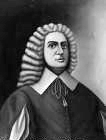
Jakob Abbadie, also known as Jacques or James Abbadie, was a French Protestant minister and writer. He became Dean of Killaloe, in Ireland.

Lancelot Andrewes was an English bishop and scholar, who held high positions in the Church of England during the reigns of Elizabeth I and James I. During the latter's reign, Andrewes served successively as Bishop of Chichester, of Ely, and of Winchester and oversaw the translation of the King James Version of the Bible. In the Church of England he is commemorated on 25 September with a lesser festival.

Jacques-Bénigne Lignel Bossuet was a French bishop and theologian renowned for his sermons and other addresses. He has been considered by many to be one of the most brilliant orators of all time and a master French stylist.
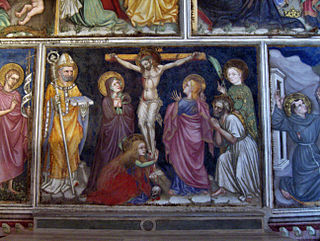
Jacobus de Voragine was an Italian chronicler and archbishop of Genoa. He was the author, or more accurately the compiler, of the Golden Legend, a collection of the legendary lives of the greater saints of the medieval church that was one of the most popular religious works of the Middle Ages.
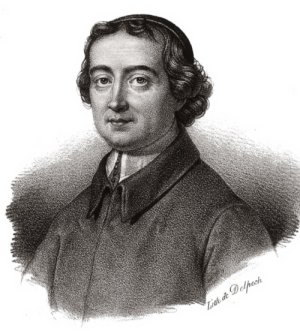
Jean-Baptiste Massillon, CO, was a French Catholic prelate and famous preacher who served as Bishop of Clermont from 1717 until his death.

A sermon is a religious discourse or oration by a preacher, usually a member of clergy. Sermons address a scriptural, theological, or moral topic, usually expounding on a type of belief, law, or behavior within both past and present contexts. Elements of the sermon often include exposition, exhortation, and practical application. The act of delivering a sermon is called preaching. In secular usage, the word sermon may refer, often disparagingly, to a lecture on morals.

Bernardino of Siena, OFM ,was an Italian Catholic priest and Franciscan missionary preacher in Italy. He was a systematizer of Scholastic economics.

Sydney Smith was an English wit, writer, and Anglican cleric. Besides his energetic parochial work, he was known for his writing and philosophy, founding the Edinburgh Review, lecturing at the Royal Institution and remembered for his rhyming recipe for salad dressing.
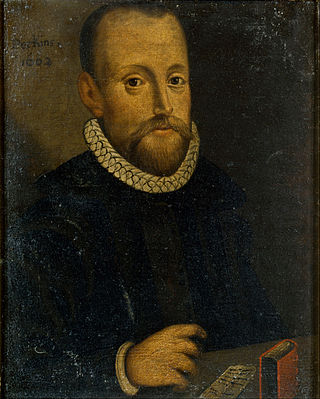
William Perkins (1558–1602) was an influential English cleric and Cambridge theologian, receiving a B.A. and M.A. from the university in 1581 and 1584 respectively, and also one of the foremost leaders of the Puritan movement in the Church of England during the Elizabethan era. Although not entirely accepting of the Church of England's ecclesiastical practices, Perkins conformed to many of the policies and procedures imposed by the Elizabethan Settlement. He did remain, however, sympathetic to the non-conformist puritans and even faced disciplinary action for his support.

Johann Geiler von Kaysersberg was a priest, considered one of the greatest of the popular preachers of the 15th century. He was closely connected with the Renaissance humanists of Strasbourg, whose leader was the well-known Jakob Wimpfeling (1450–1528), called "the educator of Germany". Like Wimpfeling, Geiler was a secular priest; both fought the ecclesiastical abuses of the age, but not in the spirit of Martin Luther and his adherents. They looked, instead, for salvation and preservation only in the restoration of Christian morals in Church and State through the faithful maintenance of the doctrines of the Church. However the moral reforms of Johann Geiler laid the groundwork for the Protestant reformation in Strasbourg.

In religious studies, homiletics is the application of the general principles of rhetoric to the specific art of public preaching. One who practices or studies homiletics may be called a homilist, or more simply, a preacher.

Caesarius of Arles, sometimes called "of Chalon" from his birthplace Chalon-sur-Saône, was the foremost ecclesiastic of his generation in Merovingian Gaul. Caesarius is considered to be of the last generation of church leaders of Gaul who worked to integrate large-scale ascetic elements into the Western Christian tradition. William E. Klingshirn's study of Caesarius depicts Caesarius as having the reputation of a "popular preacher of great fervour and enduring influence". Among those who exercised the greatest influence on Caesarius were Augustine of Hippo, Julianus Pomerius, and John Cassian.
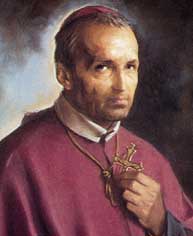
Alphonsus Liguori, CSsR, sometimes called Alphonsus Maria de Liguori or Saint Alphonsus Liguori, was an Italian Catholic bishop, spiritual writer, composer, musician, artist, poet, lawyer, scholastic philosopher, and theologian. He founded the Congregation of the Most Holy Redeemer, known as the Redemptorists, in November 1732.
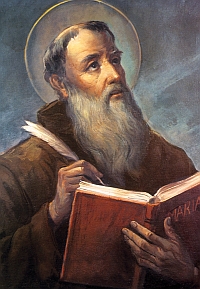
Lawrence of Brindisi, OFM Cap., born Giulio Cesare Russo, was an Neapolitan Catholic priest, theologian and member of the Order of Friars Minor Capuchin. An accomplished linguist, in addition to his native Italian, Lawrence could read and speak Latin, Hebrew, Greek, German, Czech, Spanish, and French fluently. Lawrence was ordained a priest at the age of 23. Lawrence was beatified on 1 June 1783 and canonized as a saint on 8 December 1881.

Fabius Claudius Gordianus Fulgentius, also known as Fulgentius of Ruspe was a North African Christian prelate who served as Bishop of Ruspe, in modern-day Tunisia, during the 5th and 6th century. He has been venerated as a saint.

John Justus of Landsberg was a German Carthusian monk and ascetical writer.
Vincent Houdry was a French Jesuit preacher and writer on ascetics.

Eckhart von Hochheim, commonly known as Meister Eckhart, Master Eckhart or Eckehart, claimed original name Johannes Eckhart, was a German Catholic theologian, philosopher and mystic, born near Gotha in the Landgraviate of Thuringia in the Holy Roman Empire.
Tommaso de Sarria, O.P. was a Roman Catholic prelate who served as Archbishop of Taranto (1665–1682) and Archbishop of Trani (1656–1665).

















